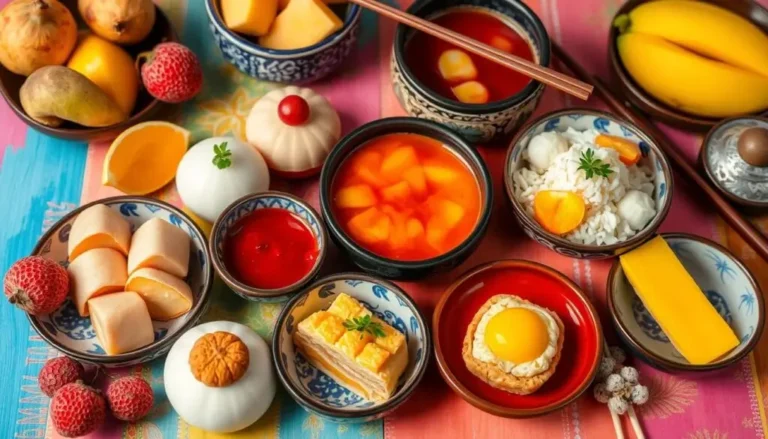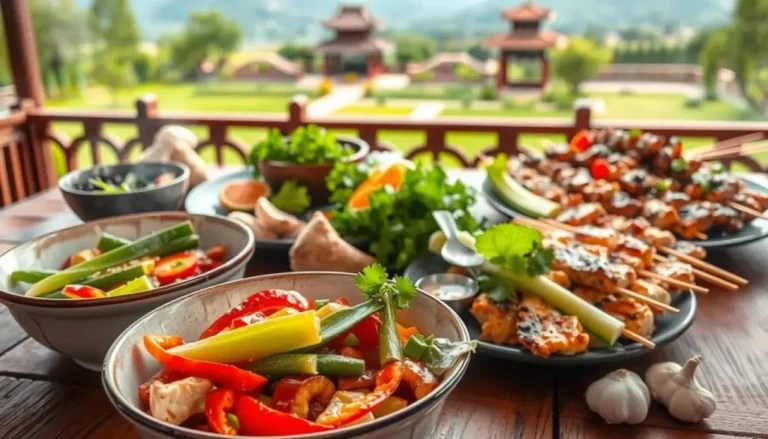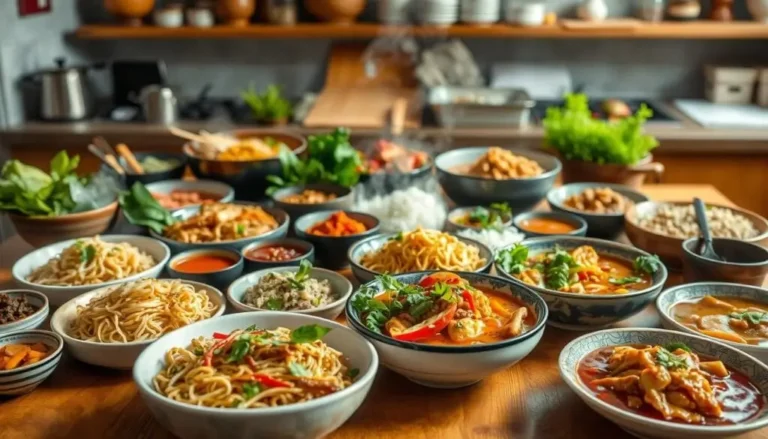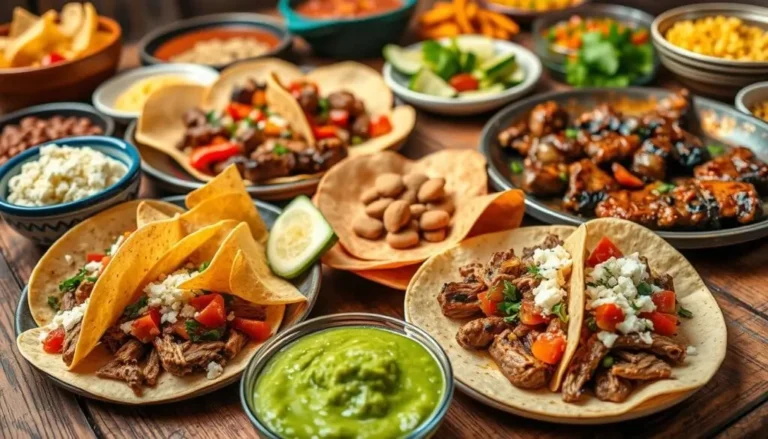Authentic Moroccan Breakfast Recipes for a Delicious Start
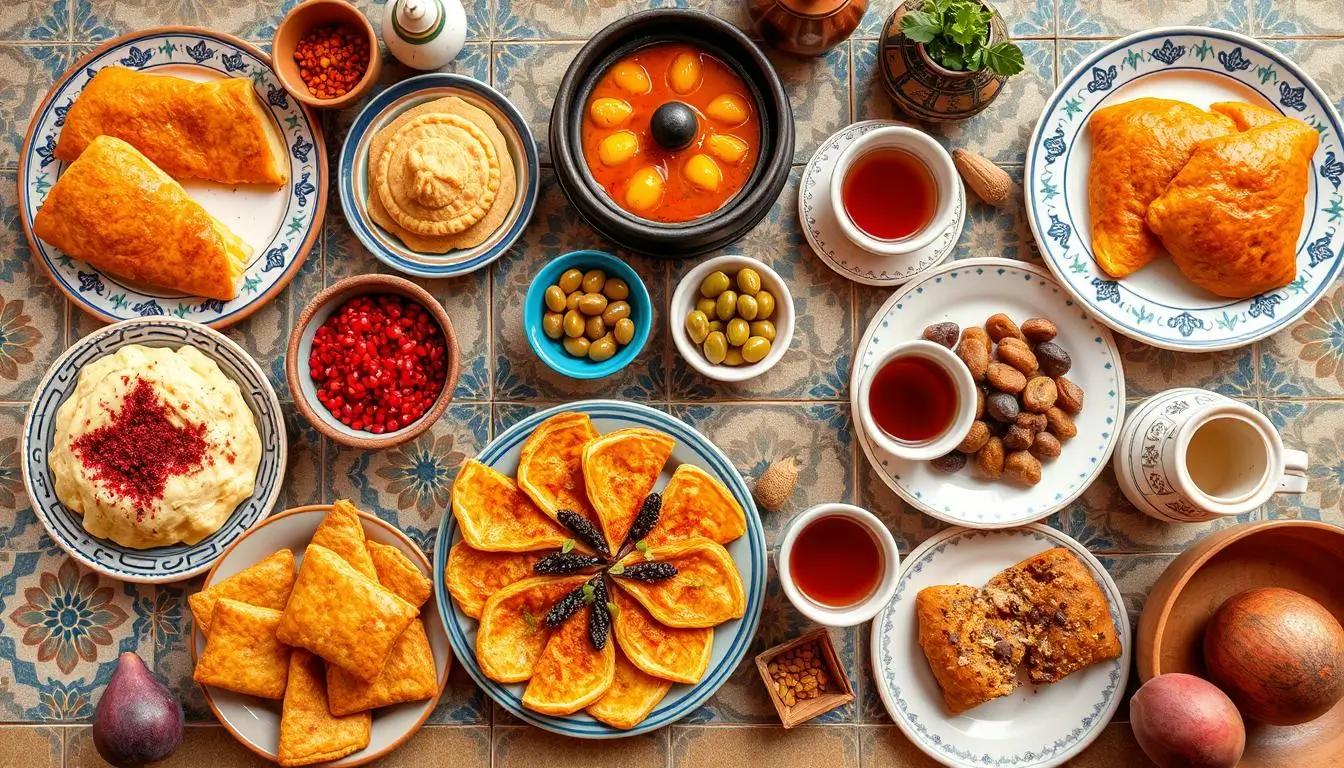
Imagine waking up to a table full of Moroccan breakfast recipes. They turn your morning into a food adventure. Each bite shares stories of tradition, family, and culture that last for generations.
Moroccan food is more than just eating. It’s a journey for your senses. From the warm Khobz bread to the layered Msemmen pancakes, these dishes offer a mix of flavors. They balance savory and sweet, and are both complex and comforting.
Table of Contents
Introduction to Traditional Moroccan Morning Cuisine
Explore the rich world of Moroccan breakfast culture. Every morning meal is a story of tradition, hospitality, and culinary art. It’s a journey into the heart of traditional Moroccan cuisine.
History of Moroccan Breakfast Culture
The roots of Moroccan breakfast traditions are deep. They blend Berber, Arab, and Mediterranean cultures. Moroccan morning rituals are more than eating. They celebrate community and connection.
- Influenced by Berber, Arab, and Moorish culinary traditions
- Reflects Morocco’s unique geographical positioning
- Incorporates diverse ingredients and cooking techniques
Essential Morning Rituals in Morocco
Every Moroccan morning starts with special rituals. These rituals make breakfast a sacred social event. The preparation of mint tea, known as Atay bnanah, is key. Fresh bread, like khobz or msemmen, is shared among family.
“Breakfast in Morocco is not just about food, it’s about sharing love and building connections”
The Social Importance of Breakfast
Breakfast in Morocco is more than just food. It’s a time for families to come together. They share stories and strengthen bonds.
The morning meal includes many delightful items:
- Fresh bread
- Local cheeses
- Olives
- Eggs
- Mint tea
Exploring Moroccan breakfast culture shows us a world where food is a language of love. It’s about hospitality and shared experiences.
Essential Ingredients for Moroccan Breakfast Dishes
Exploring Moroccan breakfasts starts with its key ingredients. These ingredients make simple dishes into works of art. They add a burst of flavor and aroma to your morning.
Moroccan spices are at the heart of breakfast flavors. Your morning table will feature a mix of ingredients that showcase North African cuisine.
- Olive oil: A foundational ingredient in most Moroccan breakfast staples
- Fresh herbs: Parsley and cilantro for bright, fresh flavors
- Aromatic spices: Cumin, paprika, and turmeric
- Bread varieties: Khobz and msemmen as primary breakfast accompaniments
Moroccan breakfasts are known for their unique mix of ingredients. This blend makes for unforgettable meals.
| Ingredient Category | Key Components | Typical Usage |
|---|---|---|
| Proteins | Eggs, preserved meats | Primary breakfast protein sources |
| Oils & Fats | Olive oil, argan oil | Cooking and flavoring |
| Produce | Tomatoes, olives, lemons | Fresh ingredients for sauces and sides |
“In Moroccan cooking, every ingredient tells a story of tradition and flavor.”
These essential ingredients shape your Moroccan breakfast. From olive oils to spices, each adds to a genuine culinary experience.
Traditional Shakshuka: A Moroccan Egg Delicacy
Shakshuka is a vibrant Moroccan egg dish that turns simple ingredients into a masterpiece. It’s a favorite breakfast that combines rich flavors and nutrients. It will make your taste buds happy and give you energy in the morning.
This dish comes from North African cuisine and has won hearts around the world. It’s known for its bold flavors and easy preparation. The recipe mixes fresh ingredients and spices to create a delicious meal for any time.
Key Spices for Authentic Shakshuka
To make real shakshuka, you need to know the key spices:
- Ground cumin
- Smoked paprika
- Caraway seeds
- Red pepper flakes
- Fresh garlic
Step-by-Step Preparation Guide
To make traditional Shakshuka, follow these steps for the best flavor:
- Sauté onions and bell peppers in olive oil
- Add minced garlic and spices
- Pour in crushed tomatoes
- Create wells for eggs
- Crack eggs directly into tomato sauce
- Cover and cook until eggs are set
Serving Suggestions and Variations
You can make your shakshuka even better with some creative touches:
| Variation | Additional Ingredients |
|---|---|
| Vegetarian Option | Spinach, mushrooms |
| Protein Boost | Feta cheese, beans |
| Spicy Version | Jalapeños, extra red pepper flakes |
Enjoy your shakshuka with warm pita bread or crusty sourdough. Add fresh cilantro on top. This authentic Moroccan egg dish is best served straight from the pan!
Moroccan Breakfast Recipes for Beginners
Exploring easy Moroccan breakfast dishes can make your mornings more delicious. These simple recipes are perfect for those new to Moroccan cuisine. They help you create authentic flavors without complicated techniques.
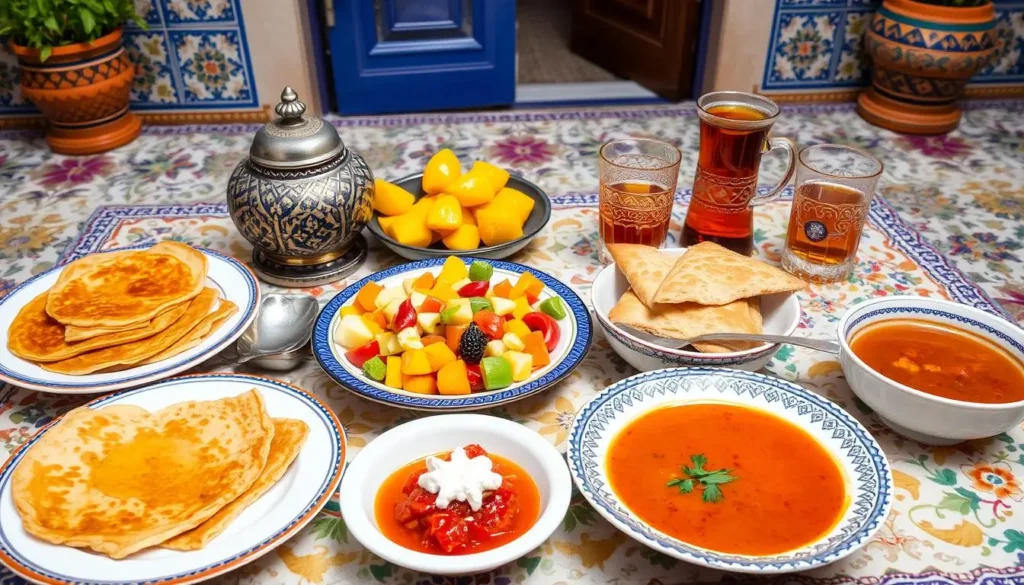
- Berber Omelette: A quick and flavorful egg dish
- Khobz: Traditional Moroccan bread
- Baghrir: Semolina pancakes
For beginners, we suggest starting with these essential techniques:
- Gather fresh, local ingredients
- Learn basic spice combinations
- Practice simple cooking methods
“Cooking Moroccan food is about embracing simplicity and bold flavors” – Traditional Moroccan Chef
Here’s a quick guide for your beginner Moroccan breakfast journey:
| Dish | Difficulty Level | Prep Time |
|---|---|---|
| Berber Omelette | Easy | 15 minutes |
| Khobz Bread | Intermediate | 30 minutes |
| Baghrir Pancakes | Easy | 20 minutes |
Remember, practice makes perfect! Start with these simple dishes and build your confidence in creating authentic Moroccan breakfasts.
Khobz: Traditional Moroccan Morning Bread
Moroccan bread, known as khobz, is a key part of Moroccan baking. It makes every breakfast special, filled with flavor and culture. Starting your Moroccan food journey with khobz is a great way to begin.
The khobz recipe comes from generations of Moroccan families. It’s simple but packed with flavor and cultural importance.
Essential Ingredients for Authentic Khobz
- High-quality wheat flour
- Active dry yeast
- Warm water
- Sea salt
- Olive oil (optional)
Baking Techniques and Tips
Learning to bake Moroccan bread takes time and effort. The secret to great khobz is in the right mix of ingredients and technique.
- Knead the dough well to build gluten
- Let it rise for a good amount of time
- Shape into flat, round loaves
- Use steam in the oven for a crispy crust
“Bread is the heart of Moroccan hospitality” – Moroccan Culinary Proverb
Your khobz should come out golden, with a crispy outside and soft inside. The smell will make you feel like you’re in a Moroccan kitchen.
| Technique | Purpose |
|---|---|
| Steam Baking | Creates crispy, golden crust |
| Scoring Top | Allows even expansion, adds aesthetic appeal |
| Preheating Stone | Ensures uniform heat distribution |
Whether you’re new to baking or have experience, making khobz is a fun start to Moroccan baking. Enjoy the journey, and you’ll connect with a rich culinary tradition.
Mint Tea: The Essential Morning Beverage
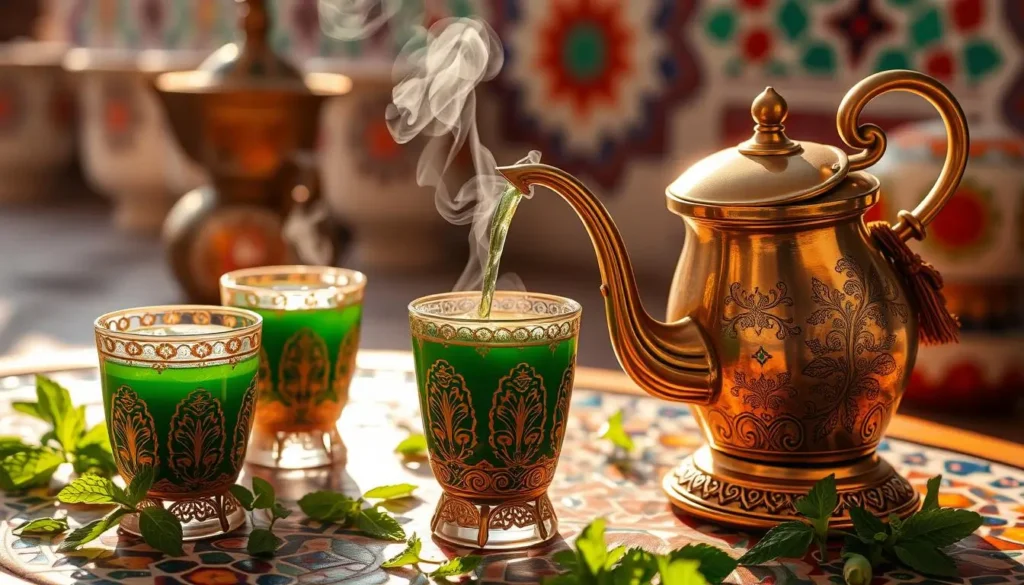
Moroccan mint tea is a key part of Moroccan culture. It shows hospitality and warmth in every glass. It’s more than a morning drink; it’s a way to connect and celebrate Moroccan food.
Learning about Moroccan mint tea starts with its unique taste. It mixes spearmint with Gunpowder green tea. This mix creates a refreshing flavor that wakes you up.
“Mint tea is not just a drink, it’s a cultural experience that tells the story of Morocco in every sip.”
Health Benefits of Moroccan Mint Tea
- Aids digestion
- Supports immune system
- Enhances cognitive function
- Relieves cold and flu symptoms
Tea Preparation Techniques
| Ingredient | Quantity | Purpose |
|---|---|---|
| Fresh Mint Leaves | 6-8 leaves | Primary flavor |
| Gunpowder Green Tea | 1-2 teaspoons | Base tea |
| Sugar | To taste | Sweetness |
To make Moroccan mint tea, steeping time is key. Brew for 2-3 minutes to get the right flavors. You can drink it hot or iced, making it perfect for any time.
Try adding lemon, honey, or ginger to your mint tea. Each change tells a new story of Moroccan food creativity.
Msemmen: Moroccan Square Pancakes
Explore the world of Msemmen, traditional Moroccan pancakes. They add a unique twist to your breakfast. These square pancakes are a key part of Moroccan breakfasts, blending texture, flavor, and culture.
Msemmen are more than breakfast food. They are a culinary art that needs skill and patience.
Mastering the Folding Technique
To make perfect Msemmen, you need to fold the dough right. Here’s how to get those flaky layers:
- Start with a dough of semolina and wheat flour
- Divide the dough into 80-gram balls for even sizes
- Flatten each ball and add a thin layer of oil
- Fold the dough into layers, up to 9 times
- Make sure they are square, about 10×10 cm
Traditional Accompaniments
Enjoying Msemmen means trying the right sides. Here are some classic choices:
| Sweet Options | Savory Options |
|---|---|
| Honey | Herbed cheese |
| Fresh jam | Spiced meat fillings |
| Butter | Vegetable mixtures |
“Msemmen is not just a food, it’s a celebration of Moroccan culinary tradition.” – Moroccan Food Historian
Remember, making Msemmen takes time. Cook each side for 20-30 seconds over medium heat. With patience, you’ll get the hang of making these tasty Moroccan pancakes!
Harira: A Hearty Morning Soup
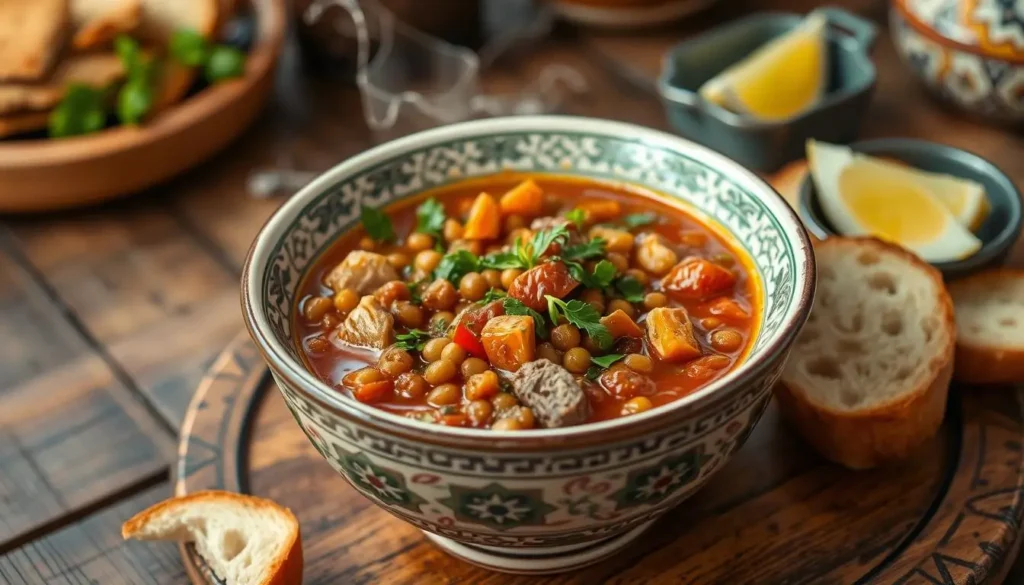
Explore the world of Harira, a traditional Moroccan soup that changes your morning. It’s more than a meal; it’s a celebration of flavors and traditions passed down through generations.
Harira is a key part of Moroccan breakfasts, offering a nourishing start to your day. It’s a mix of ingredients that tells the story of Morocco’s culinary history.
- Rich in protein from lentils and chickpeas
- Bursting with aromatic spices like turmeric and cinnamon
- Loaded with fresh herbs including parsley and cilantro
“Harira is not just a soup, it’s a warm embrace of Moroccan hospitality” – Moroccan Food Historian
Harira starts with special ingredients. Tomatoes give it a bright color, while lentils and chickpeas add nutrition. The spice mix, with cinnamon, ginger, and saffron, makes it a culinary wonder.
| Ingredient | Nutritional Benefit |
|---|---|
| Tomatoes | Rich in Vitamin C |
| Lentils | High Protein Content |
| Chickpeas | Fiber and Minerals |
In Ramadan, Harira is more than food; it’s a sign of spiritual renewal and community. Families come together to break their fast with this nourishing soup, sharing stories and making memories.
Looking for a warm breakfast or a taste of Morocco? Harira offers a true Moroccan experience that will take you to North Africa’s lively food scene.
Sweet Moroccan Breakfast Pastries
Moroccan pastries turn your morning into a feast for the senses. They are more than food; they celebrate Moroccan culture through taste and skill.
Exploring Moroccan desserts starts with a variety of pastries. These treats show the beauty of Moroccan cooking.
Popular Pastry Varieties
- Sfenj: Moroccan doughnuts with a crispy exterior
- Baghrir: Delicate pancakes with hundreds of tiny holes
- M’hancha: Almond snake pastry rolled in delicate layers
Traditional Filling Options
The fillings of Moroccan pastries are rich and decadent. You’ll find a wide range of flavors that make simple ingredients special.
| Filling Type | Flavor Profile | Typical Use |
|---|---|---|
| Almond Paste | Nutty and Sweet | M’hancha Pastry |
| Date Filling | Rich and Caramel-like | Sfenj Variations |
| Honey Mixture | Floral and Intense | Baghrir Topping |
“In Morocco, pastries are not just food – they are an expression of hospitality and tradition.” – Moroccan Culinary Expert
These pastries are indulgent, with about 701 calories per serving. They show the richness of Moroccan sweet breakfasts.
To make these pastries, use top-notch ingredients. Choose extra-virgin olive oil and fresh orange blossom water for the best taste.
Berber Omelette Preparation
Discover the authentic Berber Omelette recipe, a quintessential Moroccan breakfast dish. It brings the vibrant flavors of North African cuisine to your kitchen. This traditional Moroccan eggs preparation is simple yet packed with incredible taste and cultural significance.
“A true taste of Morocco in every bite” – Moroccan Culinary Experts
Your Berber Omelette starts with carefully selected ingredients for a rich, hearty meal. Here’s what you’ll need:
- 6 fresh eggs
- 2 ripe tomatoes
- 1 small red onion
- 1 green pointed pepper
- 1 deseeded chili
The spice blend is crucial for authentic flavor. Your Moroccan breakfast dish comes alive with:
- 1 tsp ground ginger
- ½ tsp ground turmeric
- 1 tsp ground cumin
Cooking time is relatively quick. The tomato sauce simmers for 10-15 minutes. Eggs cook for just a few minutes. The recipe easily serves two people but can be scaled up for larger groups.
| Ingredient | Quantity |
|---|---|
| Olive Oil | 1 tbsp |
| Olives | 20g |
| Fresh Coriander | 10g |
| Fresh Parsley | 10g |
Pro tip: For a unique twist, try adding whole eggs instead of beaten eggs. Serve immediately with crusty khobz bread for an authentic Moroccan breakfast experience.
Fun fact: In Tamraght, you’ll find this delightful Berber Omelette in nearly every cafe and restaurant. It shows its popularity in Moroccan cuisine.
Modern Twists on Classic Moroccan Breakfasts
Contemporary Moroccan cuisine is getting a fresh makeover. Chefs are mixing old breakfast recipes with new global flavors. Now, your morning meal can be a mix of tradition and modern flair.
The world of Moroccan breakfasts is growing. You’ll find new takes on old favorites that please both young and international tastes.
- Avocado toast topped with traditional Moroccan spice blends
- Shakshuka served over quinoa instead of traditional bread
- Msemmen filled with unexpected ingredients like Nutella or artisan cheeses
*Culinary innovation is about respecting tradition while embracing creativity*
New Moroccan recipes are focusing on plant-based and special diets. Vegan versions of old dishes are becoming popular. They use beans and fresh herbs for a healthy twist.
| Traditional Dish | Modern Twist | Dietary Adaptation |
|---|---|---|
| Shakshuka | White Bean Shakshuka | Vegan Option Available |
| Msemmen | Nutella-Filled Pancakes | Vegetarian Friendly |
| Mint Tea | Dairy-Free Mint Smoothie | Vegan |
Your breakfast can now be a journey of taste and culture. Try these new recipes and make your morning a flavorful adventure.
Health Benefits of Traditional Moroccan Breakfast Foods
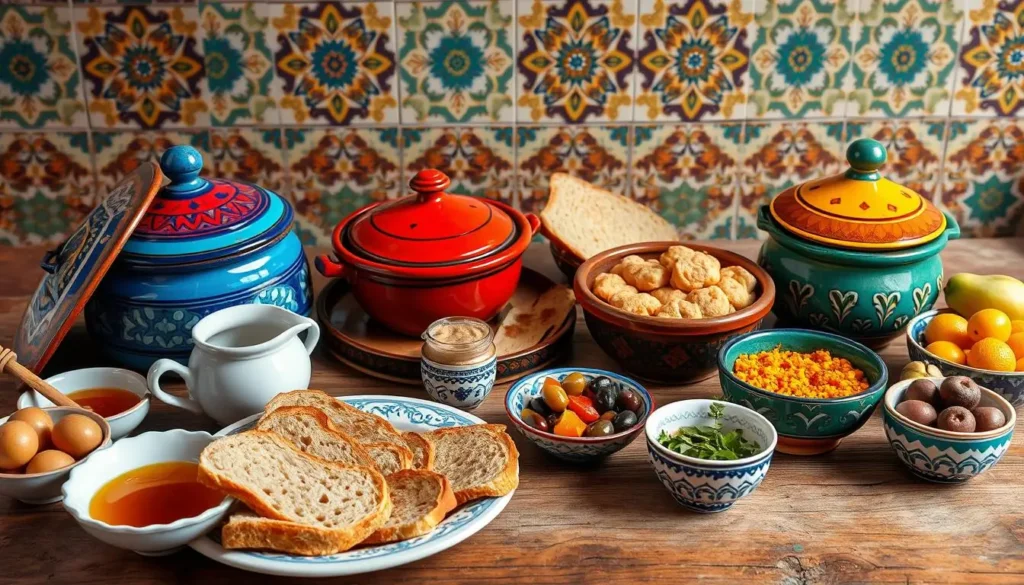
Discover the amazing nutritional value of Moroccan breakfast. It’s a key part of the Mediterranean diet. These meals are not just tasty; they’re full of ingredients that boost your health.
Healthy Moroccan dishes are packed with nutrients for wellness. Here are some key nutritional highlights:
- Rich in heart-healthy monounsaturated fats from extra virgin olive oil
- Abundant fresh vegetables providing essential vitamins and minerals
- Lean proteins supporting muscle health and satiety
- Whole grains delivering sustained energy and fiber
Spices are vital in Moroccan breakfast nutrition. Cumin and turmeric have anti-inflammatory properties. These help protect your body and improve metabolism.
“Food is our body’s most powerful medicine” – Traditional Moroccan Wisdom
Your morning meal can include eggs in shakshuka, nutrient-dense bread, and omega-3 packed fish. Each adds to a balanced diet. This supports heart health, brain function, and weight management.
- Olive oil: Reduces cholesterol
- Nuts: Provides healthy fats
- Whole grains: Improves digestion
- Fresh herbs: Boosts antioxidant intake
By embracing these traditional breakfast elements, you’re not just eating. You’re following a centuries-old nutritional strategy. This promotes longevity and well-being.
Seasonal Breakfast Variations in Morocco
Exploring Moroccan cuisine shows a rich mix of traditions tied to local farming. Ingredients change with the seasons, making breakfasts full of flavor. This reflects Morocco’s varied landscapes and rich culture.
Moroccan food culture celebrates each season with special breakfasts. These meals use fresh, local ingredients and old cooking methods.
“In Morocco, every season tells a delicious story through its unique breakfast specialties.”
Seasonal Breakfast Highlights
- Summer Delights: Fresh figs, melons, and light fruit dishes are common
- Winter Warmth: Hearty soups like Harira offer comfort
- Spring Freshness: Herb omelettes and teas are popular
- Autumn Harvest: Pumpkin and squash are used in breads and pastries
Every season in Morocco brings a new breakfast experience. Families in coastal and mountain areas adjust their meals to match the local harvest and weather.
| Season | Key Ingredients | Typical Breakfast Dishes |
|---|---|---|
| Summer | Fresh fruits, light grains | Baghrir (semolina pancakes), fruit salads |
| Winter | Root vegetables, legumes | Harira soup, warming grain dishes |
| Spring | Fresh herbs, young vegetables | Herb omelettes, mint tea |
| Autumn | Squash, nuts, dried fruits | Pumpkin breads, nut pastries |
Trying these seasonal breakfasts lets you truly experience Moroccan traditions. Each bite shares stories of local farming, culture, and Morocco’s lively food scene.
Conclusion
Your journey into traditional Moroccan recipes shows us a vibrant breakfast world. It’s not just about eating; it’s about experiencing rich flavors and cultural stories. Every dish shares tales of family, tradition, and history.
Moroccan breakfasts are a celebration of community and warmth. Dishes like Shakshuka and Harira soup showcase Morocco’s diverse culture and fresh ingredients. The use of spices and fresh ingredients makes every meal a feast for the senses.
Trying these recipes connects you to a long-standing culinary tradition. Whether making simple Msemmen or complex dishes, you’re part of a tradition that feeds both body and soul. It shows how food can reveal a culture’s depth and richness.
As you explore and make these dishes, remember it’s about more than eating. It’s about making moments of joy and connection. Each recipe invites you to slow down and appreciate the rich heritage of Moroccan cooking.
FAQ
What are the most essential ingredients in a traditional Moroccan breakfast?
How do I make authentic Moroccan Shakshuka?
What is Msemmen, and how is it prepared?
Is Moroccan breakfast suitable for vegetarians?
How important is mint tea in Moroccan breakfast culture?
What health benefits do traditional Moroccan breakfast foods offer?
Are there seasonal variations in Moroccan breakfast cuisine?
Have you cooked any of our recipes yet?
There are no reviews yet. Be the first one to write one.

